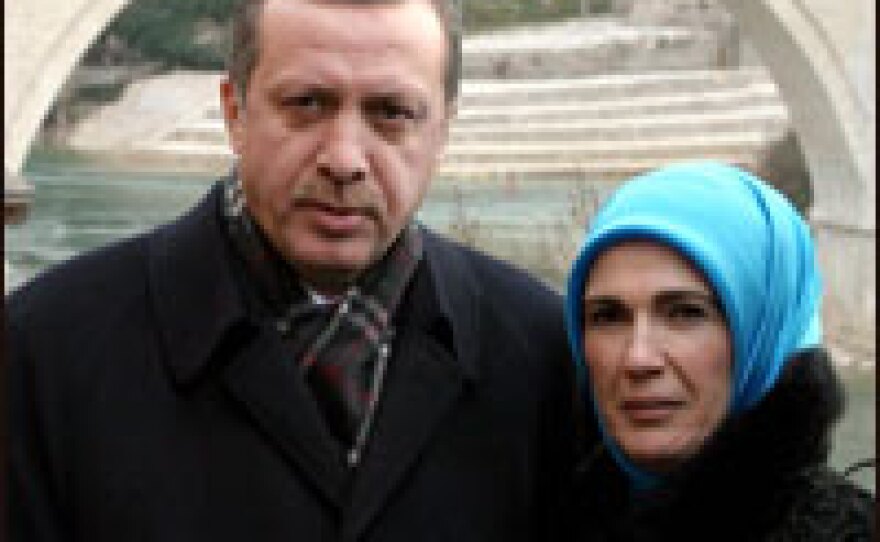

Turks head to the polls on Sunday for parliamentary elections, just two months after protests by opposition parties and the Turkish military led to the annulment of presidential elections.
The political crisis struck a blow to moderate Islamist Prime Minister Recep Tayip Erdogan, whose Justice and Development Party, or AK Party, as it is known in Turkey, is running for re-election after 4 ½ years in power.
Heightened Voter Interest
Normally, Turkey's Mediterranean beach resorts are jam-packed with vacationing Turks. But this week, tourist associations report hotel bookings are down 50 percent in many coastal towns, as Turks cancel or cut short their summer holidays to go home and vote on Sunday.
This group includes Reha Guner, an economist from Istanbul. Earlier this week, he sat relaxing in his bathing suit by a hotel pool in Alanya, a town on the Mediterranean Sea. Guner said most of his friends were heading home to vote against Erdogan's ruling AK Party.
"This year it's important, because this political party is a bit radical," Guner explained. "It's too...Muslim."
On the other side of the hotel pool sat Ayla Cetinkaya, a proud Erdogan supporter. Dressed in an Islamic headscarf and long pants, despite the summer heat, she watched her children play in the water. Cetinkaya said she was still bitter about the secularist protests, which helped block Erdogan's candidate from winning the presidency last April.
"We are angry," she said. "We are angry at those who turned the situation into a stalemate and blocked the [presidential] election."
"The country is deeply polarized," said Nigar Goksel, editor of Turkish Policy Quarterly. "This is an election of heightened emotion, certainly, and of much tension."
Strong Economy Lifts Erdogan
The front-runner is Erdogan. He dismisses accusations by his political opponents that he has a secret Islamist agenda aimed at changing the secular system of government in this overwhelmingly Muslim country.
At a recent political rally in Istanbul, hundreds of thousands of Erdogan supporters were treated to a techno dance mix, made up of snippets of Erdogan's speeches set to a booming electronic beat.
Later, Erdogan, wearing Ray-Ban sunglasses, reminded the cheering crowd about the economic growth Turkey has enjoyed during the AK Party's time in power.
Turkey's business elite tends to agree — even though many businessmen remain suspicious about Erdogan's political leanings.
"We have actually seen an economic transformation so big that people have started talking about a paradigm shift, in which boom and bust cycles are over," said Atif Cezairli, a financial analyst with TEB Asset Management. "You have seen the middle-income class, which was disappearing due to the high inflation over the last 20 years, become alive again and start growing."
Repercussions from EU Application Process
One of the AK Party's main policy goals over the past four years has been winning Turkey's entry into the European Union. Erdogan has adopted wide-ranging reforms, aimed at improving human rights and the status of ethnic and religious minorities, including Turkey's restive Kurds. But the troubled EU application process has triggered a nationalist backlash that is expected to be felt at the polls.
Turkey's right-wing Nationalist Movement Party is expected to pass the 10 percent threshold to win positions in parliament, says the party's vice president, Oktay Vural.
"The national identity of Turks has been questioned by this government, by Erdogan," said Vural.
Nationalists like Vural also have pointed to the recent upsurge in fighting between Turkish security forces and the Kurdish separatist movement, the PKK. This week, three Turkish soldiers were killed on patrol in southeastern Turkey by a PKK landmine.
The Kurdish Factor
Candidates from an ethnic Kurdish party — accused of having links to the PKK — also appear poised to win a number of parliamentary seats Sunday. This would mark their first time in parliament since several Kurdish lawmakers were thrown in jail more then a decade ago for speaking Kurdish in parliament.
"For the past 13 years [the Kurds] have had no representation," said Turkish newspaper columnist Yavuz Baydar. He pointed out that there is now a good chance that the next parliament will include both Kurdish and Turkish nationalists.
"If they can ... find a way of being under the same roof and start discussing the issues freely without hurting each other, I think it will be big step for Turkey," Baydar added.
The wild card in this process is the powerful Turkish military, which publicly opposed Erdogan's candidate in last April's abortive presidential election.
The army also has been calling in recent months for a cross-border military operation against PKK bases in northern Iraq. Once the elections are over, Turkish analysts warn, the generals may get their way.
Turkish artillery has repeatedly shelled suspected PKK positions across the border. Iraqi officials claim more then 140,000 Turkish troops have recently been deployed along the frontier.
Copyright 2022 NPR. To see more, visit https://www.npr.org. 9(MDAzMjM2NDYzMDEyMzc1Njk5NjAxNzY3OQ001))







